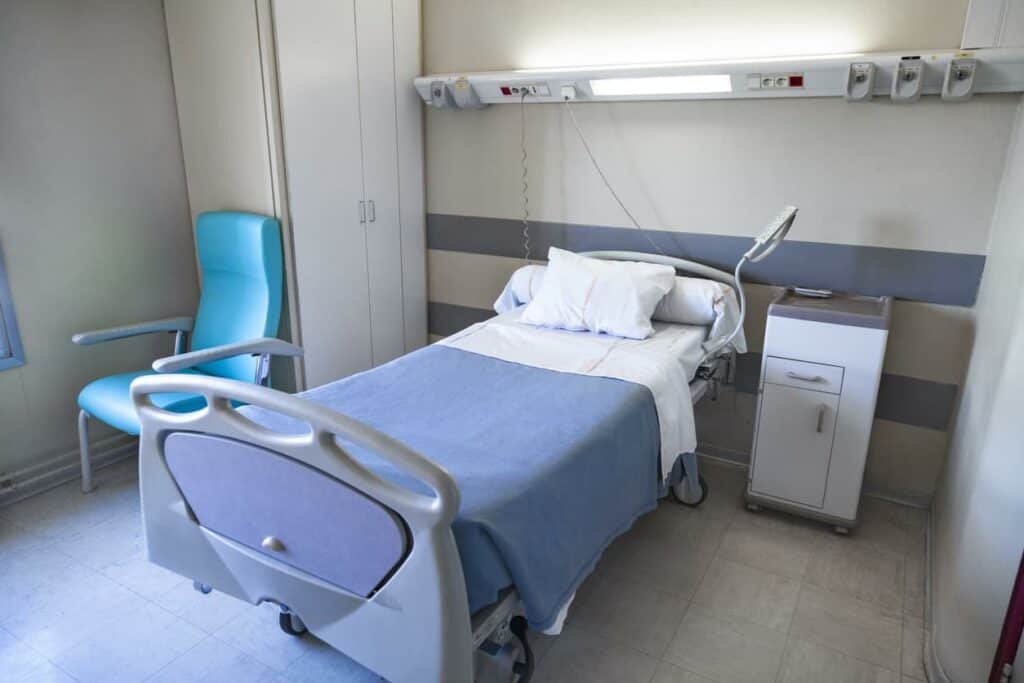When your loved one is facing a terminal illness, it’s not easy knowing you will have to lose them at some point. Although death is a natural part of life, knowing that it can occur within a certain time frame is a daunting one.
You may experience different emotions, ranging from anticipatory grief to denial, frustration, and helplessness. Your loved one may experience similar emotions.
Allowing your loved ones to voice their needs and desires is vital during their last days. Take the time to talk with them and, more importantly, to listen to them. Let them know the essential role they play in your life and how much you value their input. Describe what you are going through and allow your loved one to express their feelings, be it frustrations, acceptance, or love.
Most of the time, you will have mixed feelings as you watch your loved one face their final moments. You will hope they will eventually get well while letting go simultaneously. These roller coasters of emotions may be very painful. To make things worse, you may not have the necessary support. This is where hospice care comes in handy; you and your loved one will have a team of professionals who aim to ensure overall well-being and improve quality of life.
Your loved one can access hospice care from the comfort of their homes, nursing homes, assisted living homes, or even at hospice homes. The hospice care team focuses on providing you and your loved one quality care.

Understanding Hospice Care
When you seek hospice care for your loved one who is terminally ill, they will receive specialized care that ensures their physical, social, emotional, and spiritual well-being as they near the end of life. Hospice focuses on excellent, quality, and comfortable care that ensures your loved one retains their dignity even as they face the end of their lives.
Sometimes, in the course of your loved one’s illness, it may be clear that there is no cure. At other times, your loved one may choose to forego some treatments. According to the National Institute on Aging, hospice care aims to help you and your loved one cope in such a scenario. When beginning hospice care, your loved one needs to understand that they are no longer responding to curable treatments.
Importance of End-of-Life Care
End-of-life care is crucial to families and their loved ones when facing a life-limiting health condition. During these trying times, hospice care offers resources, advice, services, referrals, and crucial information.
Additionally, you and your loved one will benefit from the emotional and practical support that you will receive from the hospice care team.
Other benefits include and are not limited to the following:
- Personalized care that uniquely meets you and your loved one’s needs.
- Customized care plan.
- Peace of mind knowing your loved one’s care is in the hands of professionals.

Components of Hospice Care
Some of the essential components of hospice care include
- Information on the family perceptions and expectations of the dying and death.
- Easy access to competent and skilled hospice care providers across all states
- Discussions on hospice or end-of-life care options for future planning
- Early recognition that a patient is approaching or requiring end-of-life support.
- Hospice care assesses patients‘, families’, and caregivers’ needs and develops a care plan that addresses their issues.
- Seamless transition across all care settings.
- Easy access to specialist palliative care if need be.
- Quality care during this last stage in a person’s life.
- Support for anticipatory grief, and bereavement care.
Services Provided by Hospice Care
Hospice provides physical, emotional, social, and spiritual support for your loved one. Additionally, you will access resources, information, and support to help you better understand your loved one’s needs during this time.
For instance, maybe you are facing the common misconception that you are giving up on your loved one by choosing hospice for them. Your care team can help you understand how hospice care promotes dignity and relieves a patient’s suffering while facilitating closure for patients and their loved ones.
If you are a family caregiver, you will have a support system that ensures you are in a top-notch condition to care for your loved one. You’ll have access to counseling from someone who understands what you’re going through. You’ll also have access to respite care.
Other services include:
- Physical therapy
- Occupational therapy
- Symptom management
- Availability of medical equipment like wheelchairs and hospital beds
- Dietary and nutrition counseling
Although hospice care doesn’t include curative treatments, it doesn’t, however, hasten a patient’s death. Hospice care focuses on affirming your loved one’s life and helps you understand and consider death as a natural part of life. This allows your loved one to spend their last days as comfortably as possible.

Role of The Hospice Care Team
To better understand the role of the hospice care team, you will need to know the members of this multidisciplinary team. A hospice care team comprises well-trained care professionals who ensure patients spend their last months, weeks, or days comfortably and with dignity.
The members of this esteemed team comprise the following:
- Specialized doctors
- Nurses
- chaplain
- Social workers
- Aides
- Volunteers
- Caregivers
- Bereavement specialists.
Role of Hospice Medical Directors
The role of hospice medical directors is multifaceted. First, a hospice medical director is mandated to ensure all the patients under their care receive appropriate treatment and care.
Next, they will meet with a patient’s interdisciplinary team twice a month to check on the patient’s progress and review their care plan. During the meeting, the hospice team will discuss patients, needs and address any concerns they might have.
Another role of a hospice director is to act as a patient’s and their family’s advocate. Here, they ensure your loved one’s wishes are honored.
Specialized Hospice Doctors/Physician
A hospice doctor closely monitors your loved one’s health condition. A hospice physician will also prescribe appropriate medication, ensuring patients’ last days are comfortable and pain-free (if they choose to).
Sometimes, your loved one may choose not to take some medication, and you should learn to respect their decision. Additionally, a hospice doctor usually coordinates with other hospice team members, ensuring a smooth flow of services and care. Your loved one’s primary physician can liaise with a hospice doctor and create a care plan that factors in your loved one’s desires and wishes.

Hospice Nurses
A hospice nurse plays a crucial role in your loved one’s care as they assess and manage pain and symptoms. They provide hands-on care and can teach you how to care for your loved one.
Hospice Aides
Hospice aides are usually certified nursing assistants and are essential as they provide your loved ones with personalized care. A hospice aide will ensure your loved one’s comfort and help them retain their dignity by bathing, dressing, grooming, and mouth care. Their primary role is to ease your burden as a family caregiver by performing such roles as light housekeeping and helping with activities of daily living.
Social Workers
Social workers provide psychosocial and emotional support, coordinate your loved one’s logistics, and work with insurance companies. They will also help you deal with finances and plan your loved one’s funeral per their wishes. If you want to talk, know that a social worker can lend their ears as they are friendly and good listeners!
Chaplain
Depending on your loved one’s religious traditions or personal beliefs, a hospice chaplain is available to cater to their spiritual needs as the end approaches. A hospice chaplain will be there for you and your loved one, helping you honor your loved one’s values, cultural traditions, and beliefs. If you or your loved one have your clergy, they can liaise with the hospice chaplain to meet your loved one’s spiritual needs.

Volunteers
A hospice volunteer is specially trained to help you and your loved one by providing compassionate care during the end-of-life stage. Volunteers duties in a hospice setting may range depending on a patient’s needs and desires. They may help organize your loved one’s items, visit, document your loved one’s life history, and assist with any tasks.
Bereavement Specialist
A bereavement specialist helps you address anticipatory grief and cope after your loved one’s demise. You and your family can receive bereavement support up to 13 months after your loved one’s death. They will maintain consistent contact, offer grief education, help you join support groups, and make one-on-one visits with your family.
Accessing Hospice Care
If you are thinking about hospice care but need help determining where to begin to access this service, well, worry no more. You may even be afraid to raise the topic with other family members, or you are waiting for your loved one’s physician to discuss or suggest it.
However, you don’t have to worry about all these things as long as your loved one meets the eligibility criteria. At Amy’s Eden Senior Care, we hear from patients and their families who wish they had had access to hospice care earlier.
It is crucial to know and understand that hospice care does not shorten or extend your loved one’s life expectancy. Hospice care, however, focuses on improving your loved one’s quality of time during their last days. It’s important to talk with your loved one when they have a life-limiting health condition if they want hospice care later on or when it is necessary.
If you are considering hospice care for your loved one, you can use the following steps to get the ball rolling:
Start the Conversation Early
Start this conversation as soon as possible. You can start considering hospice care as an option once your loved one has a life-limiting illness, or they are no longer responding to curative treatment options.
You may also start looking into hospice care when your loved one with an incurable illness refuses to undertake curative treatment options.
After having this discussion with your loved one, the next step is to discuss hospice as an option with a healthcare provider. It’s essential to know if your loved one is eligible for hospice care or not.

Seek Recommendations
Once your loved one’s physician agrees that they have medically met all the requirements for hospice, you can ask the physician to recommend hospice care providers or hospice programs in your area. You can also ask your family, friends, or someone with experience in hospice care.
When you have a list of hospice recommendations from family and friends, discuss them with your loved one’s physician and consider the ones they vouch for to provide care.
Alternatively, you can also visit the Hospice Foundation Directory, or the National Hospice and Palliative Care Organization (NHPCO) to check for hospice care options available in your state.
Visit A Hospice Care Provider Near You
The next step is to request a free, no-obligation visit at their hospice. In most cases, the hospice providers will send their clinician to visit your loved one, whether at the hospital, home, or assisted living home, make their clinical assessment, and answer any questions you might have. If your loved one is at the hospital, their physician’s office will help you schedule the appointment.
You can check here for a list of questions you can ask a hospice clinician when they visit your loved one for an evaluation.
Admission
When a hospice care representative visits your loved one, and you are satisfied with them, you can proceed with their admission. However, you should do this if you have a legal mandate.
Your Loved Starts To Receive Hospice Care Services
Your loved one will start receiving hospice care as soon as all the required documents have been signed. At this point, if your loved one requires any medical equipment, you can discuss it with the hospice care provider and make arrangements to have such equipment.
Some of these equipment are:
- Hospital bed
- Medical supplies for hospice services
- Oxygen
You will also have to make travel arrangements if your loved one will have to move from a hospital, home, nursing home, or assisted living home to a hospice care home.
Join the hospice team to develop a customized hospice care plan for your loved one to ensure they factor in their unique needs and desires. During this initial meeting, you can discuss family and friends’ caregiving responsibilities, dietary concerns, pain control, and medication management.

Eligibility for Hospice Care
For your loved one to begin their hospice care journey, they must be eligible for hospice care as established by the United States Centers for Medicare & Medicaid Services.
While no specific number of illness symptoms is required to qualify for hospice care, these guidelines should help you determine if your loved one’s condition is appropriate for eligibility.
- A life-limiting illness diagnosis — where your loved one has a six-month or less prognosis on their life expectancy depending on the natural progression of their health condition.
- Progression in their weight loss.
- Increased fatigue and weakness.
- Decline in cognitive abilities
- Frequent hospitalization, especially in the last six months.
- Recurrent infections
- Difficulties performing activities of daily living ( eating, bathing, dressing, grooming, toileting, and continence).
- Skin breakdown
At other times, your loved one may be eligible for hospice care under specific illness-specific requirements. These diseases include:
- Cancer
- Stroke
- Cardiopulmonary disease
- Congestive heart failure
- HIV/AIDS
- Dementia
- Renal diseases
- Liver disease
- Neurological conditions
Does My Loved One Qualify For Medicare Hospice Benefits?
Medicare is the typical source to pay for hospice.
If your loved one is over 65 or younger but living with a long-term disability, they can obtain hospice care under Medicare Part A coverage. However, if your loved one does not qualify under this category, their hospice care coverage may depend on their insurance health coverage and the hospice care provided.
Currently, you can check if your loved one qualifies for Medicare hospice care coverage under the following criteria:
- Be a legal resident/ US citizen eligible for Social Security benefits.
- Be over 65 and eligible to receive Medicare under long-term disability (for a period longer than two years) or if they have end-stage renal disease.
- The hospice facility has Medicare certification.
- A physician and a hospice medical director certification verifying that the patient has a terminal illness diagnosis and without medication to prolong their medical condition, their life expectancy doesn’t exceed six months.
- A patient signs a statement choosing hospice care instead of using regular Medicare

Palliative Care vs. Hospice Care: How Are They Different?
Although palliative care and hospice have much in common, some differences set each care unit apart. Knowing the difference will help you decide which level is ideal for your loved one. The differences include:
| Palliative Care | Hospice care | |
|---|---|---|
| Focus | Focuses mainly on pain relief, reducing stress, and helping patients lead a quality lifestyle. | Focuses mainly on ensuring a patient leads a quality lifestyle when it’s clear they have a life-limiting illness or the weight of curative treatment outweighs its benefits. |
| Beneficiary | Anyone with a severe, chronic illness who is seeking curative treatments. | A patient can benefit from hospice care when their physician recommends that the patient has less than six months of life expectancy due to their condition. |
| Curative Treatment | Yes, a patient can continue seeking and receiving curative treatment in palliative care. | No, a patient under hospice care doesn’t receive curative treatment, but they can continue receiving medications that enhance their lives, like painkillers. |
| Care Package |
|
|
| Setting |
|
|
| Payment |
|
|
| Duration of care | As long as your loved one needs it. | Your loved one can access hospice care when their doctor believes they are not likely to live more than six months.
A patient can access hospice care even after they live longer than six months. However, they have to be recertified for hospice. Your loved one can have their hospice care extended by two 90-day terms, then followed by a 60-day term. A patient can decide to leave hospice care once their condition improves or when they decide to seek curative care, with the surety that they can still go back if need be. |
Levels of Care Provided by Hospice
There are four levels of care provided by hospice; care can be provided at home or in a hospital-like setting.
They include:
- Home hospice care
- Inpatient hospice
- Continuous hospice care
- Respite care
Home hospice care
Your loved one receives hospice care from the comfort of their home. A hospice team member will visit and assess their condition and advise accordingly. For effective hospice care at home, you may have to buy or rent some equipment that ensures your loved one’s comfort and dignity.
Inpatient hospice
Your loved one may have to seek inpatient hospice care when it becomes too difficult to manage their symptoms at home. Inpatient hospice care aims at controlling severe pain and stabilizing your loved one’s symptoms. Once the hospice team achieves this goal, your loved one can go back home.
At times, your loved one may choose to spend their final days at the hospital or inpatient center, as they may see this as a safe and neutral place.
Continuous Hospice Care
Continuous hospice care is, in most cases, a form of crisis care, usually available when a patient has a medical crisis. Your loved one’s symptoms may sometimes require round-the-clock care and intensive care management. This type of hospice can benefit you as a family caregiver by allowing you to step back from the active caregiving role and spend quality time with your loved one.
Respite Hospice Care
Some hospice care facilities also offer respite care services to patients receiving hospice care from the comfort of their homes. Your loved one can occasionally move into hospice care temporarily, allowing their caregiver some time off to recharge and rejuvenate. At the hospice care facility, your loved one will receive round-the-clock care, ensuring they are comfortable and have their dignity.

Support and Resources in Hospice Care
As a leader in the senior care industry, Amy’s Eden has a wide range of informative and helpful senior care resources covering a diverse range of topics. We have resources and information that will help you and your family come to terms with the death of a loved one.
There are other resources that you, your loved one, family, and friends can benefit from as they will help you prepare for the inevitable. They include the following:
- Disease-specific Resources. Here, you will find hospice information on diseases like dementia and cancer.
- Bereavement Resources. You can easily access bereavement assistance, grief support, and advice here.
- Education Resources for Patients and their Families. These resources are geared toward educating patients and their families about hospice care.
- Resources & information on Hospice Care Team Members. This information will help you better understand the role of each member of your loved ones’ hospice care team.
- Caregivers Resources. Here, you will learn what to expect as a caregiver and the physical, emotional, and mental aspects of caregiving.
Take Away
Sometimes, life throws situations that may seem beyond us. When your loved one has a life-limiting illness, it is crucial to seek help. It’s normal to feel overwhelmed, but the sooner you find support, the more beneficial.
A hospice care team comprises highly skilled professionals whose sole aim is to provide comfort care as your loved one approaches the end of life. This gives you and your family members time to do what’s important — create beautiful moments with your loved one.
Amy’s Eden Senior Care offers end-of-life care services to help your loved one enjoy their final moments in comfort each day. Contact us today to learn more about Hospice care and how you can help your loved one embrace their final moments with grace and peace.




